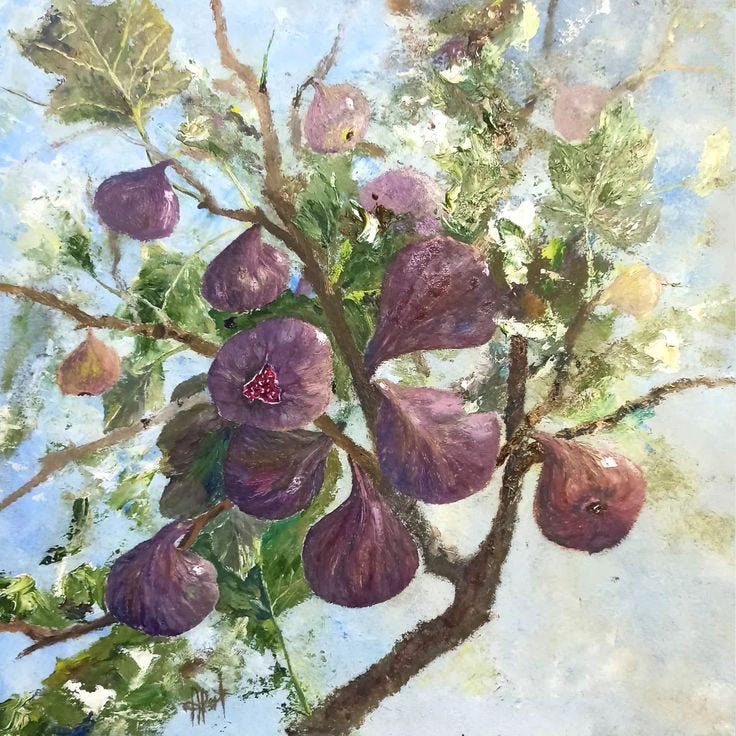It could be my own literary-driven algorithm, but everywhere I turn on social media, I keep seeing the same, often misconstrued, metaphor from Sylvia Plath. Esther, the disturbed heroine of Plath’s ubiquitous novel The Bell Jar, summarises her fleeting concept of fulfilment through the metaphor of ‘the fig tree’.
“…I wanted each and every one of them, but choosing one meant losing all the rest, and, as I sat there, unable to decide, the figs began to wrinkle and go black, and, one by one, they plopped to the ground at my feet.”
At seventeen, the first reading of the passage from The Bell Jar and later Plath’s wider works resonated with me. Profoundly. I was watching my own fig tree! Approaching options for universities, different courses, and different everything were on the horizon, so I began to share Esther’s sense that I was running out of time to live, truly and without regret. Each UCAS email confirming a decision I had or hadn’t made felt like another nail in the coffin, sealing shut the me I should, or rather, could be. The literature degree I had excitedly committed to months ago began to seem infected by possibilities of what other passions and interests I was leaving behind.
However, much like Esther does, I began to see the fig tree differently. The epiphany came to me, ironically, while picking apples. Reaching for one that seemed immaculate, rosy, and crisp, only to pull away and find a caterpillar had beaten me to it – the apple wasn’t fit for consumption. In the context of Plath’s metaphor and my own anxieties about the ‘right path,’ I thought it was fitting. Even if an apple, fig, or fruit seems to be the perfect one, you will never know until you pursue it. That university’s offer you declined indeed could have brought happiness, or perhaps it brought dissatisfaction. That course you nearly took, or the career path you were certain you’d take in Year Nine – both could have also been good choices, or they could have ended in disaster. Point being that, quite frankly, you don’t know! In terms of the metaphor that started it all, the figs are not ‘plopping at your feet’. You simply haven’t picked them yet. Even if you do or don’t, be content with what you have picked, at least for a moment, and take each experience and equally profound quote as it comes. Perennial figs can be grown and eaten again.
The issue with coming across these types of seemingly universal revelations over social media is that you are literally reading one page of an entire book. I haven’t the faintest authority to assert the intentions of Plath any more than anyone posting excerpts of her work online, so no one can claim that she didn’t intend to evoke the sense of binary restriction in her life any more than you could argue she did. That being said, if you do turn the page, Esther goes on to assuage this crushing anxiety with the context that all bad feelings are made worse with the addition of an empty stomach, a message I can wholeheartedly support.
Fig tree or otherwise, your future is yours. As such, it is also yours to change! Yes, some doors opened will close others, but it would be ridiculous to assume you would only open one door in your life – especially in your early adulthood. Anyone who knows exactly what they should be doing with their life at eighteen should not be trusted (in my humble opinion). Human existence is complicated. Sharp Instagram quotes are good for promoting discussion, but I urge you to remember that it would take novels upon novels to encompass it all, let alone one metaphor.
Another article you may enjoy: https://thebadgeronline.com/2025/10/kemptown-bookshop/

